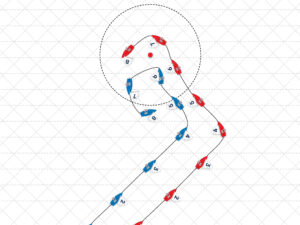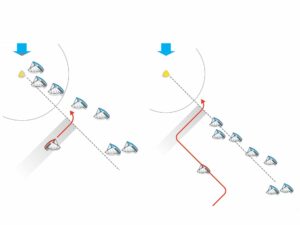There’s perhaps no better indication of when I’m really in a groove sailing wise than the ability to sniff out a windshift during a starting sequence. Amidst the chaos of a crowded one-design start—where you’re almost never sailing hard on the wind—noticing that the breeze has moved 10 or 15 degrees to the left is a difficult task.
This was the case last night in the start of our first race in Newport’s Thursday night J/24 series. Our pre-race research indicated the pin was slightly favored, but the breeze appeared stronger on the right side of the course. Our plan was for a top half (aka committee boat half of the line) start. Some time in the last minute of the start, as we were battling for a hole on the line, the wind shifted to the left. As we trimmed up to the line we were nearly bow to stern with the boat below us. Moments later, the boats that had started at the pin and tacked to port were crossing our bows by 4 boatlengths, and we were quickly into recovery mode.
Anticipating a shift hitting during the start is a very difficult task. Even if we’d seen the shift 30 seconds or a minute before we felt it on the sails, we wouldn’t have been able to make a major adjustment to our position on the line. However, merely recognizing that the wind has moved can help you mitigate the damage. In our case, the solution was a tack to port at or right after the starting gun sounded. We had a lane on port, and could’ve crossed the boats on our hip. I hesitated making the call and by the time it was apparent that we had no chance of holding our lane relative to the boat to leeward and ahead, we were unable to cross the boat on our hip. The end result was way too much time in bad air and on the unfavored tack. We bounced back later in the beat and pulled together a mid-fleet finish, but it certainly could’ve been better with a quick tack off the starting line.









